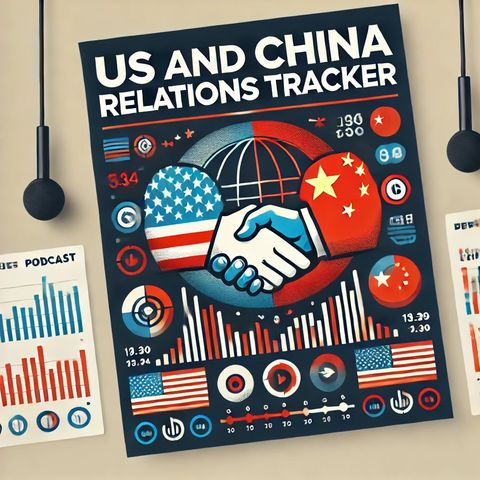Navigating the Evolving U.S.-China-India Trilateral Dynamic: Challenges and Opportunities for Global Stability

Descarga y escucha en cualquier lugar
Descarga tus episodios favoritos y disfrútalos, ¡dondequiera que estés! Regístrate o inicia sesión ahora para acceder a la escucha sin conexión.
Navigating the Evolving U.S.-China-India Trilateral Dynamic: Challenges and Opportunities for Global Stability
Esta transcripción es generada automáticamente. Ten en cuenta que no se garantiza una precisión absoluta.
Descripción
The relationship between the United States and China is one of the most complex and consequential bilateral ties in contemporary global affairs. It is marked by multifaceted interactions encompassing economic...
mostra másIn recent years, tensions have mounted over issues such as intellectual property rights, human rights practices, and territorial disputes, particularly in the South China Sea. The US has consistently voiced concerns over China's policies towards Hong Kong, Taiwan, and the Uighur population, while China criticizes US interventions in what it views as internal affairs. Meanwhile, both countries are heavily invested in addressing global issues like climate change and the pandemic, which necessitate cooperation despite other divergences.
A key player on the world stage, India finds itself in a position of strategic importance amidst US-China tensions. The US-India relationship, described by US President Joe Biden as "the most defining of the decade," is poised to be a pillar of stability and development in the Indo-Pacific region. This burgeoning partnership is characterized by shared democratic values, economic engagement, and mutual geopolitical interests, particularly surrounding China's rise.
The dynamics of US-India relations could significantly evolve depending on the incoming American administration. While the Biden administration has emphasized strengthening ties with democratic allies and partners, any shift in leadership could bring changes in diplomatic priorities. Trade policies, defense collaborations, and strategies to counterbalance China's regional influence might see recalibration.
The Quad, an informal strategic forum comprising the United States, India, Japan, and Australia, exemplifies the growing emphasis on multilateral cooperation in the region. This alliance focuses on ensuring a free and open Indo-Pacific, countering Chinese maritime assertiveness, and enhancing security, economic, and environmental cooperation.
Economically, the US and India have sought to deepen their trade relationship, with negotiations aimed at resolving tariff disputes and expanding market access. Both countries see significant potential in sectors such as technology, energy, and infrastructure. India's burgeoning digital economy presents another frontier where the US sees opportunities for collaboration and investment.
Military and defense cooperation have also seen significant upticks, with joint exercises and defense agreements underscoring the commitment to regional security collaboration. The strategic partnership is bolstered by arms sales and technology transfers, facilitating India's military modernization.
However, the path to deeper US-India engagement is not without potential roadblocks. Issues such as immigration policies affecting Indian professionals in the US, tariff disagreements, and differing views on global governance may pose challenges.
As the world looks at the evolving geopolitical landscape, the interplay between US-China tensions and the strategic US-India partnership remains pivotal. The next American president's policy directions could dramatically shape this trilateral dynamic. Priorities in diplomatic engagement, economic strategy, and defense collaboration will influence not only bilateral relations but also the broader context of international stability and prosperity. This intricate dance of diplomacy, while fraught with complexities, holds the promise of forging stronger, more resilient global partnerships.
Información
| Autor | QP-4 |
| Organización | William Corbin |
| Página web | - |
| Etiquetas |
Copyright 2024 - Spreaker Inc. an iHeartMedia Company
